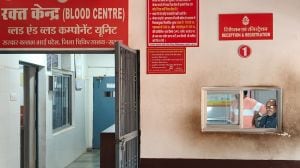Why Mumbai is struggling to rebuild
Residents of an 80-year-old building in Takumalni wadi chawl on Malad-Marve Road continue to live in peril
Residents of an 80-year-old building in Takumalni wadi chawl on Malad-Marve Road continue to live in peril because one of its 90 tenants has refused to move out to allow redevelopment. And the municipal laws Mumbai follows dont provide for forcible eviction from private buildings.
In Mumbai,an estimated 100,000 people live in over 900 dilapidated buildings. Four buildings have collapsed in three months,killing over 100 people. And redevelopment,the only solution,has failed to take off.
Apart from the fact that no resident can be evicted forcibly from a private building,redevelopment also requires the consent of 70 per cent of the tenants,which leads to a long struggle for the developers. Sometimes it takes years just to obtain the consent of 70 per cent of the tenants to begin redevelopment, says Rajesh Vardhan,chairman of Vardhman Developers,which is involved in redevelopment projects across the city.
Rehabilitation of the residents is the responsibility of the developer if it is a private building,of the Maharashtra Housing and Area Development Authority MHADA if it is a cessed building,and of the Brihanmumbai Municipal Corporation if it owns the building.
Tenants and developers have to come to an agreement in terms of the area of flats available after redevelopment,and the benefits to tenants. In turn,the developer also has to find a feasible incentive to take up those redevelopment projects, Vardhan says. Even if the consent is received,tenants who have not agreed usually do not leave their homes.
The BMC is looking at ways to make forcible eviction from private buildings legally possible. With the Mumbai Municipal Corporation Act of 1888 preventing this,the BMC is checking with its law department if it can invoke the National Disaster Management Act for eviction from highly dangerous buildings,even if they are private.
There are problems with civic-owned properties,too. Tenants are provided transit accommodation until they can be shifted back,but not everyone is willing to go. In most cases,we observe that the tenants have to continue living in transit camps even after five to 10 years of being shifted,which has created a sense of distrust, said Vardhan.
According to a recent study by the Mumbai Transformation Support Unit,merely eight per cent of the 16,000-odd MHADA-cessed buildings have been redeveloped since 1999. Tenants looking to get the best deal and developers assured very little incentive are the key reasons for the poor record,say real-estate industry experts.
The effect of the Rent Control Act was devastating on Mumbai,mainly because in the 1950s most residents roughly 75 per cent of all families lived in rented buildings or chawls. Many buildings along the Marine Drive,where rich people found houses,were rented out at meagre amounts such as Rs 100-200, says Sulakshana Mahajan,urban planning consultant at the Mumbai Transformation Support Unit. One needs to restore the rights of the landowners and curtail the rights of the tenants,including removing the 70-per-cent consent rule.
Residents refuse to move because very often there is a tenant-owner issue. The tenants fear that after they vacate their homes,they will get nothing as the owner will hand it for redevelopment and earn all the profit while they have to struggle with problems of escalated rent and other issues, says Ramakant Biradar,assistant municipal commissioner of P South Goregaon whose count of dilapidated structures is among the highest.
We received a notice from the BMC asking us to vacate the private building in 2012. Some of us have been living here for over 20 years. Together we all agreed to give the building for redevelopment. But the landlady wants to take up redevelopment on her own, says Ansari Mohammed Sameer,a resident of the 40-year-old Zaki Mansion in Kurla,an area with the largest number of dilapidated building.
Residents want a say in the redevelopment and a share of the benefits,and are reluctant to allow the owner to go ahead without striking an understanding with them. Where can we go? We cannot afford rent at other places, Sameer says. We have told the BMC of our problem of alternative accommodation but they have not responded.
Why will a family living in south Mumbai agree to live in a transit camp in a far-off area such as Charkop,Kandivali or places such as Mankhurd and Kurla? Their children might be going to local schools near their homes,their place of work may also be nearby, says Minister of State for Housing Sachin Ahir.
On why redevelopment projects have not taken off,Ahir says there is still no political will to implement them.
- 01
- 02
- 03
- 04
- 05































